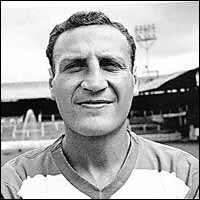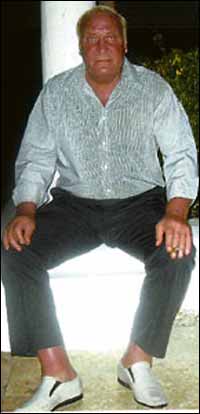|
PROFILE Footballing legend of 50 years ago cost £27,500 | ||
THE accent is old school East End, reminiscent of a bygone era and a defiant spirit during the Blitz.
A time when organised crime ruled and a good ol' punch-up was the way to sort things out. And life could have been very different for former footballer Mark Lazarus had he decided to follow his brothers, Lew and Harry, into boxing. But he chose to use his feet rather than his fists and became a favourite at numerous London clubs - and a legend at Queen's Park Rangers. Mark became Britain's first big name Jewish footballer when First Division Wolverhampton Wanderers signed him for a then club record fee of £27,500 in 1961 - although he only made nine appearances for them. Hoops fans best remember Mark, now 72, scoring the winning goal in the 1967 League Cup final against West Bromwich Albion at Wembley. He is still feted at Loftus Road, often meeting up with old team mates at dinners organised by QPR. "I'm from a tough background and we had to look after ourselves," Mark, who was brought up in Stepney, said from his Essex home. "My brothers were boxers and my family had fought against Mosley's Blackshirts. "There was no antisemitism in the East End - that came later when we moved to Chadwell Heath, in Essex, when I was six. "We were the only Jewish family in the area and I had fights every day on the way to school. "The other kids called me names, but it didn't make me feel any different, that's just how kids behaved." Mark, whose grandparents were eastern European immigrants, didn't have a Jewish upbringing, nor was he barmitzvah. But he remains fiercely proud of his heritage. He explained: "We were Jewish by name and by nature. "Nobody ever started on us about that in the East End or said anything derogatory - we were a fighting family, after all." Football in the mid-1950s, when Mark started to attract the attention of scouts from professional clubs, was, of course, nothing like the billion-pound corporate and global phenomenon that it is today. Not actively encouraged by his parents, Martha and Isaac, to go down the football route, his dad warned him to take an apprenticeship in case his footballing dreams did not come to fruition. On the books of Fulham and Chelsea as a schoolboy, he became an apprentice in the upholstery trade. Mark recalled: "I did a bit of boxing, fought in a few bouts as an amateur, but I just enjoyed playing football. Simple as. "Anyway, football was an easier game than fighting. "I played for my school, district and then county sides. "In those days, football was a short-lived career and after footballers had finished, many of them end up on the dole, so my dad wanted me to have a trade behind me. "I was always off in the park playing football and Jimmy Greaves and I played in the same Saturday side. "Jim and I were best of friends and he used to come round to my parents' home for his tea." Mark, a naturally gifted right winger, was soon spotted by Leyton Orient's Alec Stock. Stock, an old-fashioned, suited and booted wily old manager, was to form a close bond with Mark, signing him later for QPR. He spent two years at Brisbane Road before Stock, by now in charge at QPR, persuaded him to move from east to west London. It was the first of three spells for Mark at Loftus Road. Division One soon came calling, however, and the iconic Stan Cullis clinched Mark's signature for Wolverhampton Wanderers in 1961. It was not to be a happy time for him however. Mark played just nine times for the boys from the Black Country and didn't get on with the formidable Cullis. He remembered: "I never, in my whole career, asked for a transfer and would have preferred to have stayed in London. "Cullis was a sergeant major type who was never happy, even when we won. Nothing was good enough for him and we had a personality clash. "Alec felt he had a responsibility to look after QPR financially too so I was seen as a saleable object." Never capped for England, Mark felt that he may have received a call-up had he stayed at Wolves. He'd heard rumours that Manchester City were interested, but they chose to sign Mike Summerbee instead. A return to London beckoned - again with QPR - where he enjoyed a second spell for two years before moving to Brentford. After two years with the Bees, he headed back to QPR again, where perhaps his greatest footballing achievement was realised. QPR, then in the Third Division, beat top-flight West Brom in the League Cup Final at Wembley, with Mark scoring the winning goal in the 81st minute in front of a crowd of nearly 100,000. Recognisable names in the line-up on that day include Rodney Marsh, Frank Sibley and Les Allen. Mark insists: "It was not my proudest moment - that came every time my team won. "It was only a tap-in, it was not as though I beat three men and smashed the ball into the back of the net from the edge of the area. "The lead-up to the final was tremendous, though. We had a great season. "That final was the first game my mum and dad saw me play in. "My dad had never been to a game in his life and he never went to any more after the final. "My mum loved it though, and after that, she always came to see me play." Mark spent one more year at QPR before moving to Crystal Palace, whom he helped reach the top-flight.
Sixty-three games and 17 goals later he moved on to a second spell with Orient, where he enjoyed promotion again, this time from the old Division Three. Altogether, Mark achieved four promotions, including twice with QPR, and saw out his career with non-league teams Folkestone, Ilford and Wingate and Finchley. As one of the few British Jewish professional footballers, he admits that he had to endure antisemitism, sadly from fellow players and fans. Mark remembered: "The worse antisemitism I ever received, fan wise, was at Sunderland. "They called me a 'Jew-b*****d' and said I should be sent back to the ovens. "I got it from players too, mostly snide antisemitic comments. "A lot of managers would tell their full-backs to get me riled and say certain things to me. "Defenders used to kick me, but I responded by playing well and doing my best." Other notable Jewish players in the British game included Dave Metchick, who enjoyed spells at Fulham and Orient, former Orient, Palace and Manchester City midfielder Barry Silkman and David Pleat, who would forge a more successful career as a manager. But Mark is candid about why there have not been more. "I've never really thought about it and I don't care, to be honest," he maintained. "Perhaps Jewish people are more interested in furthering their education and going into business." He is also scathing about today's game and said he never watches football on television. From a relaxed and affable manner when recalling his playing days, he seems perplexed about both modern football and its high-earning stars. "Football has not changed for the good since I played," Mark lamented. "It is a different game entirely, players just want to touch the ball once and walk the ball into the net. It is all geared towards money. "People compare Ryan Giggs with Georgie Best, which, to me, is ridiculous. "Giggs is good, but if a player can pass the ball these days all of a sudden he is brilliant. "There is nobody in the same class as Jimmy Greaves or Bobby Charlton today. "All the money has cancelled out the individualism. "The referees are so protective of players that there is no physical side whatsoever." Mark added: "So many wingers today don't even beat the first man. "I remember watching David Batty and Ray Wilkins and they just used to play the ball sideways. "Lots of wingers cannot even cross the ball properly and these are fellas who are being paid £50,000 or more. It frustrates me. "The only one I can think of who can actually cross is David Beckham." No doubt if Mark was playing today he would be earning big money, unlike when he first started out and was being paid £14.10 a week. His modesty only drops when he compares himself to Cristiano Ronaldo, stating: "He runs at people, tricks them and goes past them like I used to do. He is exciting." Married to Fay, who he met at a dance club in the West End, for 52 years, father of two children and grandfather of five, Mark still likes to sit down and go through his scrapbook. He said: "I look at it and I am satisfied with my career. I am a very happy person." Gentleman Mark could certainly teach today's over-paid stars a thing or two about diffidence and humility. As I speak to Mark, he tells me he is watching snooker and much prefers it to football. Orient chairman and snooker executive Barry Hearn is a close friend and Mark worked as a minder for the stable of snooker players managed by him. Those boxing days certainly came in handy.
|
 MARK LAZARUS: In his playing days
MARK LAZARUS: In his playing days TODAY: Mark as a septuagenarian
TODAY: Mark as a septuagenarian